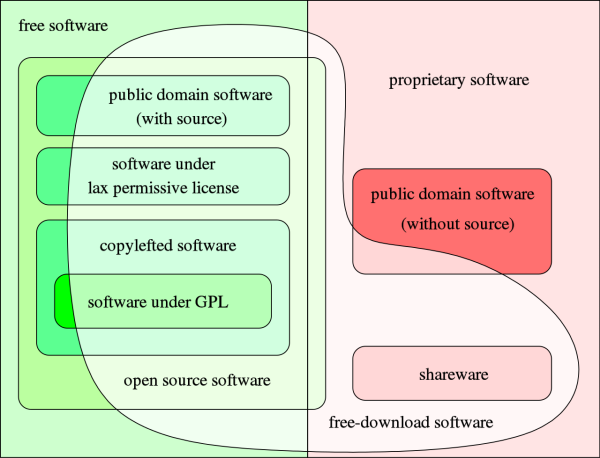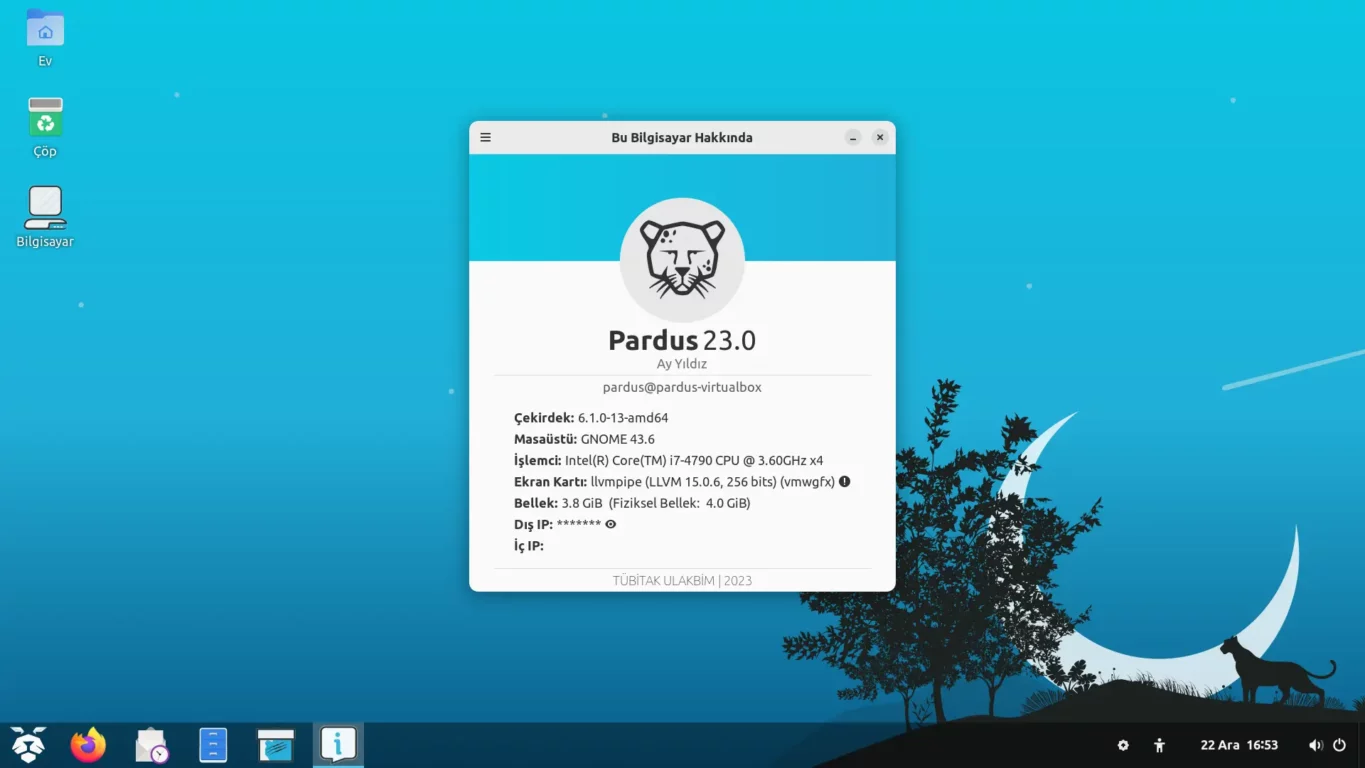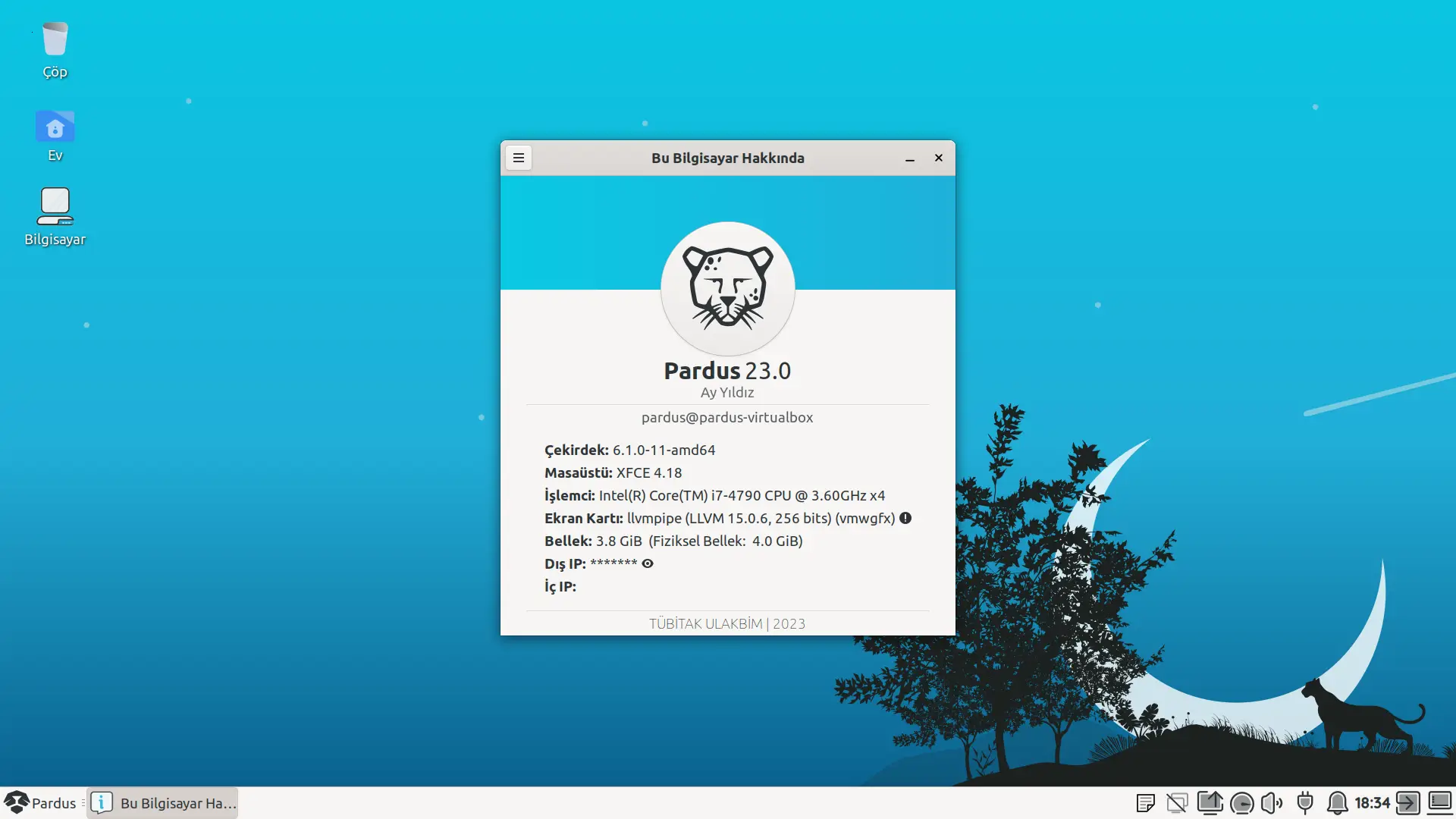
- Sahipli (mülk) Yazılım
- COPYLEFT (Telif Feragatı)
- GNU GPL Genel Kamu Lisansı (GPL)
- GNU Kısıtlı Genel Kamu Lisansı (LGPL)
- X11, Expat ve BSD lisansları (FreeBSD,OpenBSD,NetBSD)
- FreeWare (ücretsiz sahipli yazılım), ShareWare (kısıtlı yazılım)
- Kamuya Açık Yazılım
EULA(End-User License Agreement)
- Yazılımın kutusunu açmadan lisans anlaşmasının ne olduğunu göremezsiniz.
- Yazılım sözleşmesini onaylamadan yazılımı kuramazsınız.
- Yazılımın kaynak kodunun paylaşılmasına izin vermez.
- . . .

Copyleft (Telif Feragatı)

Copyleft, bir programın (veya başka bir çalışmanın) özgür yazılım haline getirilmesi, programın tüm değiştirilmiş ve geliştirilmiş sürümlerinin de özgür yazılım olması için genel bir yöntemdir. gnu.org
Telif feragatı, her kullanıcının özgürlüğe sahip olmasını garantiler. Programı ve değiştirilmiş sürümlerini sahipli yazılım (mülk yazılım) haline gelmesinden korur. Telif feragatı kavramı ilk kez 1985’te Richard Stallman tarafından GNU Manifestosu’nda ortaya atılmıştır.
GNU‘nun ürettiği lisanslar GPL, LGPL, FDL telif feragatlı lisanslardır.
Özgür Yazılım Lisansları
GNU GPL (General Public License) / Genel Kamu Lisansı
GNU Genel Kamu Lisansı (GNU GPL ya da GPL) yaygın kullanılan bir özgür yazılım lisansıdır. İlk sürümü 1989 yılında Richard Stallman tarafından GNU Tasarısı için kaleme alınmıştır. Güncel versiyonu GPLv3 tür.
İzin Verilenler
- Ticari Kullanım
- Dağıtma
- Değiştirme
- Özel Kullanım
- Patent Kullanımı: bu lisans katkıda bulunanlara patent alma hakkı verir.
Kullanım koşulları
- Kullandığınız yazılımı açık kaynaklı yapmak zorundasınız.
- Lisansın bir kopyasını kullanacağınız yerde bulundurmalısınız.
- Yeni yazılım aynı lisansla veya uyumlu lisansla lisanslanmalıdır.
- Yazılımdaki değişiklikleri belirtmek zorundasınız.
GPLv2 ve GPLv3 arasındaki temel farklar:
- GPLv2, 1991 yılında yayınlanmıştır ve günümüzde hala kullanılmaktadır. GPLv3 ise 2007 yılında yayınlanmıştır.
- GPLv2, patent konusunda GPLv3 kadar korumacı yaklaşım sergilemez. GPLv2 lisanslı bir yazılım bir patenti kullanma hakkını vermez. GPLv3 ise patent sahiplerinin patentlerini kullanıcılarına karşı kullanmalarını sınırlar.
- GPLv2, yalnızca yazılımın kaynak kodunun dağıtılmasını zorunlu kılar. GPLv3 ise yazılımın kaynak kodu ve derlenmiş halinin dağıtılmasını zorunlu kılar.
- GPLv2, yalnızca yazılımın dağıtımı sırasında değişikliklerin bildirilmesi gerektiğini belirtir. GPLv3 ise yazılımın kullanımı sırasında yapılan değişikliklerin de bildirilmesi gerektiğini belirtir.
LGPL (GNU Lesser General Public License)
Kısıtlı Genel Kamu Lisansı, yaygın olara kütüphaneler için kullanılmakta olup , kendisini kullanan hedef yazılımın kaynak kodunun açık olması şartının gerektirmez.
LGPL bir yazılım değiştirilip yeniden dağıtılıyor ise değişikliklerin yapıldığı bölümlerin kaynak kodları kullanıcıya sunulmalıdır.
AGPL (GNU Affero General Public License)
GNU Affero Genel Kamu Lisansı, lisanslı yazılımla bir ağ üzerinden etkileşim kuran kullanıcıların kaynak kodu alması için ek bir şarta sahiptir.
GPL ile Uyumlu Özgür Yazılım Lisansları
- GNU General Public License (GPL) (GNUGPL v3/v2)
- GNU Lesser General Public License (LGPLv3/v2.1)
- GNU Affero General Public License (AGPL)
- GNU All-Permissive License (GNUAllPermissive)
- Apache License, Version 2.0 (apache2)
- Artistic License 2.0 (ArtisticLicense2)
- Clarified Artistic License (ClarifiedArtistic)
- Berkeley Database License (BerkeleyDB)
- Boost Software License (Boost)
- Modified BSD license (ModifiedBSD)
- CeCILL version 2 (CeCILL)
- The Clear BSD License (clearbsd)
- Cryptix General License
- eCos license version 2.0 (eCos2.0)
- Educational Community License 2.0 (ECL2.0)
- Eiffel Forum License, version 2 (Eiffel)
- EU DataGrid Software License (EUDataGrid)
- Expat License (Expat)
- FreeBSD license (FreeBSD)
- Freetype Project License (freetype)
- . . . . .
GPL ile Uyumsuz Özgür Yazılım Lisansları
- Affero General Public License version 1
- Academic Free License, all versions through 3.0
- Apache License, Version 1.1
- Apache License, Version 1.0
- Apple Public Source License (APSL), version 2
- BitTorrent Open Source License
- Original BSD license
- CeCILL-B version 1
- CeCILL-C version 1
- Common Development and Distribution License
- Common Public Attribution License 1.0 (CPAL)
- Common Public License Version 1.0
- Condor Public License
- Eclipse Public License v1.0/v2.0
- European Union Public License v1.1 /v1.2
- Fraunhofer FDK AAC license
- Gnuplot license
- IBM Public License, Version 1.0
- Jabber Open Source License, Version 1.0
- LaTeX Project Public License 1.3a / v1.2
- . . . . .
Özgür Olmayan Yazılım Lisansları
- No license
- Aladdin Free Public License
- Anti-996 License
- Anti-Capitalist Software License
- Apple Public Source License (APSL), version 1.x
- Artistic License 1.0
- AT&T Public License
- Code Project Open License, version 1.02
- Commons Clause
- CNRI Digital Object Repository License Agreement
- eCos Public License, version 1.1
- The Hippocratic License 1.1
- GPL for Computer Programs of the Public Adm.
- Hacktivismo Enhanced-Source Soft. Lic Agr.
- Jahia Community Source License
- The JSON License
- Old license of ksh93
- License of Lha
- Microsoft’s Shared Source CLI, C#, Jscript L
- NASA Open Source Agreement
- . . . . .
Kaynak : gnu.org
Daha fazla bilgi için gnu.org sitesini ziyaret edebilirsiniz..
Lisans metinleri : GPLv3, GPLv2, GPLv1
BSD (Berkeley Software Distribution) Lisansları
- Yazılımın dağıtımı sırasında yapılan değişikliklerin bildirilmesini zorunlu tutmaz. Bunun yerine, yazılımın dağıtımı sırasında yapılan değişikliklerin yalnızca yazılımın kaynak kodunun dağıtılmasını zorunlu kılar. BSD lisansları, yazılımın özgürce kullanımını kolaylaştırır ve yazılımın kullanımı sırasında yapılan değişikliklerin gizlenmesine izin verir.
- BSD 3-Clause License: Bu lisans, yazılımın kaynak kodunun dağıtılmasını ve değiştirilen yazılımın aynı lisans ile dağıtılmasını zorunlu kılar. Ancak, yazılımın kullanımı sırasında yapılan değişikliklerin bildirilmesine gerek yoktur.
- BSD 2-Clause License: Bu lisans, yalnızca yazılımın kaynak kodunun dağıtılmasını zorunlu kılar. Değiştirilen yazılımın aynı lisans ile dağıtılmasına gerek yoktur.
- BSD 0-Clause License: Bu lisans, yazılımın kaynak kodunun dağıtılmasına ve değiştirilen yazılımın aynı lisans ile dağıtılmasına gerek yoktur. Bu lisans, yazılımın özgürce kullanımını en çok özelleştirmeye izin verir.
Değiştirilmiş BSD Lisansı (ModifiedBSD)
Tanıtım maddesinin kaldırılmasıyla değiştirilen özgün BSD lisansıdır.
- GNU GPL ile uyumlu,
- Esnetilebilir, hoşgörülü,
- Copyleft olmayan bir özgür yazılım lisansı.
Open BSD Lisansı
Değiştirilmiş BSD lisansına dayanır ve herhangi bir patent lisansı vermediğini açıkça ifade eden bir koşul eklenmiştir.
- GPLv2 ve GPLv3 ile uyumlu
BerkeleyDB (Berkeley Veritabanı Lisansı)
- GNU GPL ile uyumlu.
Expat Lisansı / MIT Lisansı (Massachusetts Institute of Technology)
MIT Lisansı Lisansı, yayınlanan kodların sahipli (mülk) yazılımlarda kullanılmasına, o yazılımın da lisanssı dağıtması durumunda imkan verir.
- GPL ile uyumlu
- Copyleft değil
MPL (Mozilla Public License)
MPL prensip olarak, BSD lisansının olanaklarıyla GNU Genel Kamu Lisansı’nı bir araya getirmeye çalışır.
- Kısmen Copyleft
CDDL (Common Development and Distribution License)
- Mozilla Kamu Lisansı (MPL) temel alınarak Sun Microsystems tarafından oluşturulmuştur.
- GPL ile uyumsuz olmasına karşın, Çıkan ürünlerin GPL uyumlu lisanslarla lisanslanmasını amaçlar.
Apache 2.0 Lisansı
Apache Yazılım Vakfı (ASF) tarafından yayımlanan bir özgür yazılım lisansıdır.
- GPLv3 ile uyumlu
- Copyleft değil
- Dağıtım konusunda özgür ya da açık kaynak olma koşulu koymaz.
Özgür Belge Lisansları
- GNU Free Documentation License FDL
- FreeBSD Documentation License
- Apple’s Common Documentation License, Version 1.0
- Open Publication License, Version 1.0
Özgür Olmayan Belge Lisansları
- Open Content License, Version 1.0
Bu lisans özgür olma niteliğine sahip değil, çünkü kopyalar için para istemeye yönelik kısıtlamalar barındırıyor. - Creative Commons NonCommercial, any version
Bu lisans özgür olma niteliğine sahip değil, çünkü kopyalar için para istemeye yönelik kısıtlamalar barındırıyor. - Creative Commons Noderivatives, any version
Bu lisans özgür olma niteliğine sahip değil, çünkü değiştirilmiş sürümlerin dağıtımında kısıtlamalar barındırıyor.
OSI (Open Source Initiative)
OSI, Kar amacı gütmeyen, Açık Kaynak lisansları sertifikalandıran kurum.
Detay için : OSI lisans listesi…
Sonraki >> Kodunuzda GNU Lisanslarını Kullanmak
İlginizi Çekebilir
ETAP’ta Pencereleri Yönetmenin En İyi Yolu: gTile ile Verimliliğinizi Artırın!
Uygulama Tanıtım
19 Şub '25Pardus Güncel Nvidia Sürücü Kurulumu
Nasıl?
26 Ara '24Bir git tabanlı projede yazma iznine sahip olmak isteyen Hackerlar(Yazılımcılar) için Kılavuz
Nasıl?
15 Şub '24Az bilinen nano özellikleri
Nasıl?
9 Şub '24



